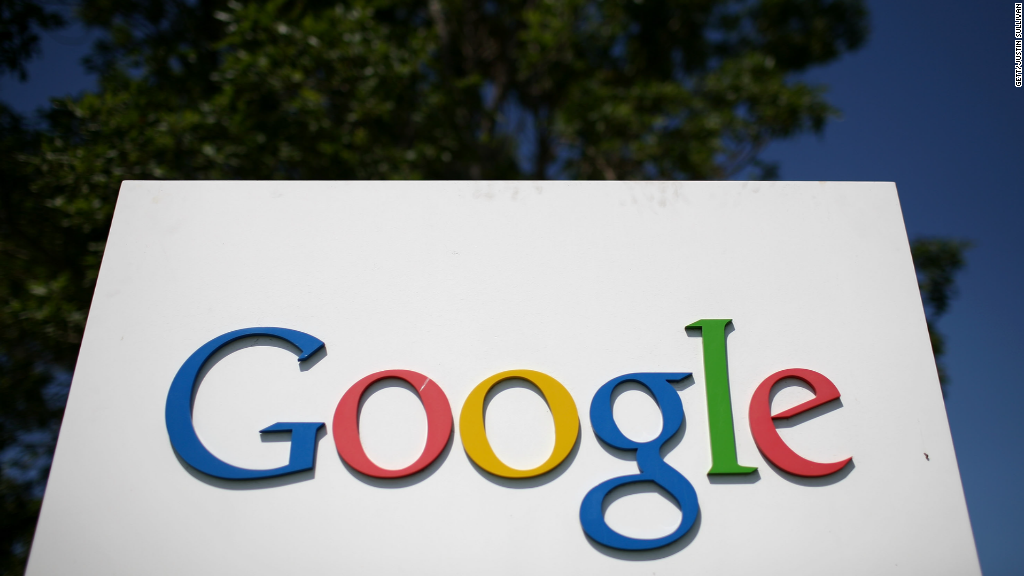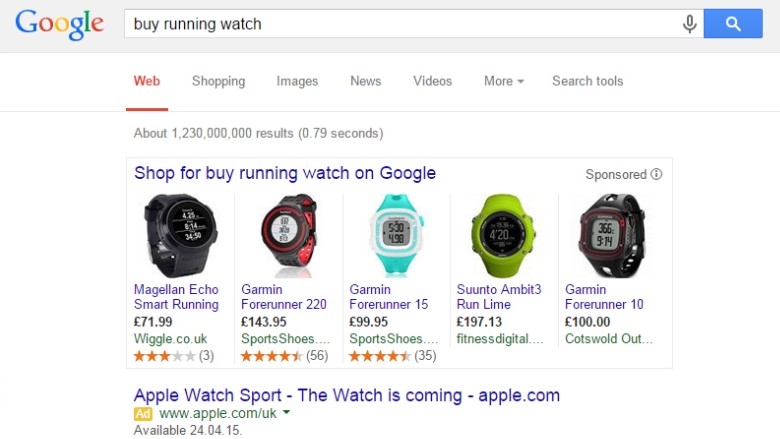
After walking away without so much as a slap on the wrist from a U.S. antitrust investigation, Google is about to get into a major fist fight with the European Union.
If Google (GOOGL) loses, it will get pummeled. The EU wants blood.
Google faces a fine of up to $6 billion -- more than a quarter's worth of profits for the search company. It also could have to change the way it displays search results in the EU (the changes wouldn't affect results in other countries, including the United States).
The European Commission's main complaint with Google involves the way it favors its own search results above competitors'. The most relevant links are not always listed first on Google.
For example, people searching for "running watch" will see photos, prices, ratings and links to five watches from companies that paid Google to advertise on the site. They won't see Amazon or other rivals' results listed first, and they're not necessarily seeing the best or most relevant products at the top of the results.

"It's not based on the merits of Google shopping that it always comes up first in search," Europe's top anti-trust official Margrethe Vestager said. "Dominant companies can't abuse their dominant position to create advantage in related markets."
The fact that the EU brought the case against Google isn't surprising. The European Commission has been probing Google's business practices in fits and starts for five years, spanning two different commissioners who have made countless threats against the search company.
Just when it seemed like Google had gained the upper hand, the European Parliament voted in favor of a non-binding resolution to break up Google, the EC voted in a new competition commissioner, and the tide turned against the search company.
The EU has also been notoriously harsh on U.S. tech companies.
Related: Europe takes on Apple, Facebook, Google and Amazon
After a failed U.S. Justice Department attempt to break up Microsoft, the EU has punished the software giant over the past decade with €1.6 billion worth of fines and by forcing the company to give Windows users browser options beyond Internet Explorer.
Intel also got slammed with a $1.4 billion fine for violating antitrust rules there -- the same case it settled for $6.5 million with the New York attorney general, after reaching a private agreement with rival AMD.
Google itself already lost its battle over the "right to be forgotten," a European law that requires the company to remove certain unwanted, inappropriate links from search results if requested. Google fought the law tooth and nail, yet lost.
So Google isn't exactly going up against a friendly government in the EU.
Vestager said the commission is acting in the interest of consumers and innovators. And she noted that one in four companies that complained about Google to her commission were U.S. companies.
But here is the problem with the European Union's case: It incorrectly assumes the starting point for consumers' shopping is always Google.
In its response to the charges, Google noted that its travel and shopping sites are woefully behind Amazon, eBay, Booking.com, TripAdvisor, Expedia and many other sites in Europe. Google might have a 90% share of the European search market, but when searching for certain products online -- the particular items that the EU is the most upset about -- Google is hardly the only search engine in town. In fact, it's not close to the largest.
"While Google may be the most used search engine, people can now find and access information in numerous different ways -- and allegations of harm, for consumers and competitors, have proved to be wide of the mark," said Amit Singhal, Google's search chief, in a blog post.
Google now has 10 weeks to officially respond to the EU's complaint. If it chooses not to settle, the case could get tied up in court for years.
The company says it "respectfully but strongly disagrees" with the complaint.
"(We) look forward to making our case over the weeks ahead," Google said in a statement.
The commission has also launched a full probe into Google's Android mobile operating system after a group of competitors accused the company of using it to "monopolize the mobile marketplace and control consumer data." Vestager said the European Union is also looking into other Google services, such as airline flights and hotel booking sites.

